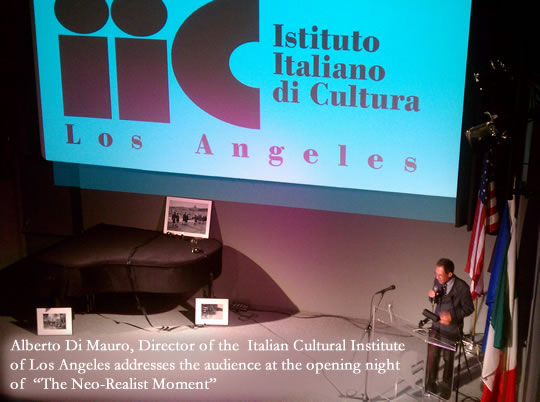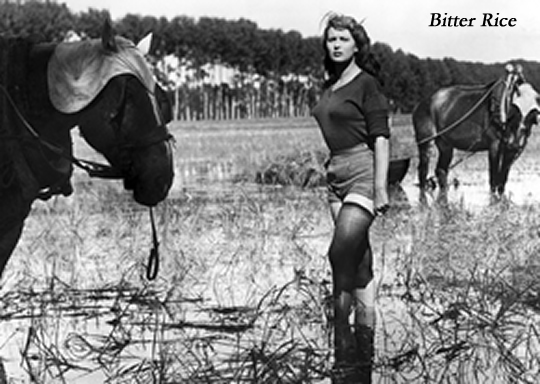 I met Alberto Di Mauro, director of the Italian Cultural Institute, LA, in his office in Westwood Village. Italian Cultural Institute, LA, has a mood of Italy in its architecture and has also been beautifully and tastefully decorated.
I met Alberto Di Mauro, director of the Italian Cultural Institute, LA, in his office in Westwood Village. Italian Cultural Institute, LA, has a mood of Italy in its architecture and has also been beautifully and tastefully decorated.
Mr. Di Mauro, a knowledgeable, cultural and humble man is very Italian in every manner (from his nice Italian accent to the dance of his hands when he talks and his deep love for Italy) and has a great sense of humor. But most importantly, he shares our love to cinema. The second time I met Mr. Mauro was at the opening night of the “The Neo-Realist Moment” exhibition, an excellent exhibition with a wonderful Italian hospitality (accompanied by good food and wine and Sicilian cheese). Alberto was looking after all the gusts, making sure they have a good time, a gesture of Italian hospitality.
What you read here is from a conversation with Mr. Alberto Di Mauro, in our first meeting:
Bijan Tehrani: Please tell us a little bit about your background before you came to LA.
Alberto Di Mauro: I have been in many places, and most of them are totally different from each other. Before coming to LA, I was in Moscow—and before that I was in Tokyo. I also spent time in Berlin, in Israel, in Senegal, in Indonesia, in Scotland, and many other locations. This has been very challenging because every time I change places, I need to understand the local culture. The way of working and promoting Italian culture needs to be adapted to the new situation each time.
BT: How much have you been connected to Italian cinema?
AM: Quite a lot because in all the places that I have been, I was engaged in organizing festivals or other events to promote Italian cinema; not only the classical Italian cinema that everyone already knows, but also the new productions. Nowadays we have new, interesting, and talented actors and film directors who provide a vivid picture of what contemporary Italy is.
BT: Coming to Los Angeles, how different is your role in promoting Italian cinema as opposed to other locations that you have worked in?
AM: Of course, here there is more attention to cinema. Los Angeles is the world capital of cinema, so in a way it is even more challenging to promote Italian cinema. We make our efforts to connect Italian cinema to American cinema and to create new and creative links.
BT: Can you tell us about any upcoming events that you’re working on?
AM: We have neo-realism already started and going on; this is a retrospective with films by famous directors like Rossellini, De Sica, Visconti, and others who have made  the history of Cinema. The event, organized by UCLA at the Armand Hammer Museum, has been launched at the Italian Cultural Institute with the opening of a photo exhibition showing rare images taken in the 40’s in Sicily, and another exhibition with shots from the most famous Neorealist films in order to give an idea of what this style means—not only for cinema, but for visual arts as well. Moreover we have, as we do every year, a festival in November at the Egyptian Theatre in Hollywood. This festival shows productions chosen from the last Festival in Venice or in Rome. We also have another festival in February which is also about the new productions of Italian Cinema; this one is connected with the night of the Oscars in LA.
the history of Cinema. The event, organized by UCLA at the Armand Hammer Museum, has been launched at the Italian Cultural Institute with the opening of a photo exhibition showing rare images taken in the 40’s in Sicily, and another exhibition with shots from the most famous Neorealist films in order to give an idea of what this style means—not only for cinema, but for visual arts as well. Moreover we have, as we do every year, a festival in November at the Egyptian Theatre in Hollywood. This festival shows productions chosen from the last Festival in Venice or in Rome. We also have another festival in February which is also about the new productions of Italian Cinema; this one is connected with the night of the Oscars in LA.
At the same time, we have regular screenings at the Institute—about two or three films every month—where often we invite the film directors and the actors to explain and elaborate about the film. Of course, we are looking for other cinema events. We are exploring avenues for an Animation Cinema Festival and other events which can go a bit deeper in the realm of Italian movies, highlighting the new culture and trends in Italian cinema.
BT: Italy was home to many great directors such as Fellini, Antonioni, and all the directors of that era— Italian cinema was the king of European cinema, and I think there is a comeback with the new films in Italy. What is your opinion of the current state of Italian cinema?
AM: As I told before, we do indeed have very talented new directors. They have absorbed the great tradition, but at the same time they have something different to tell us. Society has changed techniques as well, and consequently the films are different from the past. I remember two months ago there was a new film director in L.A. and, when they asked what he thought about the glorious Italian tradition, he answered that he wanted to show what he was able to do and not only what happened in the past. So we have to give them the possibility to make known their works. The European way of doing film, and therefore the Italian way, is different from the way in the States. They are like two different schools: to make a comparison between the two is very stimulating and enriching.
BT: Can you elaborate on the cultural events that you develop?
AM: We organize events to promote Italian culture in many different sectors like visual arts, theatre, music, and also aspects where business is mixed with artistic creativity like cooking, fashion, and design. We want to give a panorama of Italy without forgetting our tradition, and using our tradition to show what is going on now!
BT: Has a film been chosen to represent Italy in the Academy Awards next year?
AM: We don’t know yet, but it should be known in the coming days.
BT: How can people get information about your events and your programs?
AM: We have an informative newsletter available, and we also have a website, www.iicla.com.
You can become a member of the institute in order to get regular invitations, but many of our events are free of charge. We have also a library with 6,000 books where you can get most of them on out on loan. We also offer Italian language and cooking courses throughout the whole year!

